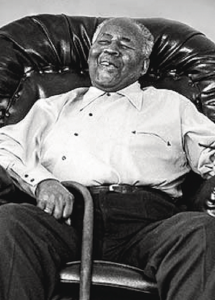
Dorsie Willis
*Dorsie Willis was born on this date in 1886. He was a Black soldier and activist.
He was the oldest of nine children born to Dochia and Cousie Willis from Meridian, Mississippi. At four, Dorsie and his family moved to Guthrie, Oklahoma. In 1904, he enlisted in the Army. During the summer of 1906, his unit, the first battalion of the 25th Infantry Regiment, was transferred from Fort Niobrara in Nebraska to Fort Brown during the Spanish-American War. This was a post near Brownsville, Texas, at the mouth of the Rio Grande River, to protect against Mexican revolutionaries.
These 167 men (Willis among them) had outstanding credentials for service, loyalty, discipline, and bravery during battles fought in Cuba and the Philippines. Six Black soldiers held the Medal of Honor, and 13 had been awarded citations for bravery in the Spanish-American War. More than half of the soldiers had been in uniform for more than five years; 25 had served in active duty for more than ten years, and one had accrued more than 27 years.
The citizens of Brownsville were racially appalled and wrote William Howard Taft, the Secretary of War, requesting that he keep the White 26th infantry at Fort Brown instead. The War Department refused to repeal the order and responded to the Brownsville citizens: "The fact is that a certain amount of race prejudice between Whites and Blacks seems to have become almost universal throughout the country, and no matter where colored troops are sent there are always some who make objections to their coming." The Brownsville citizens immediately posted new signs announcing "NO NIGGERS OR DOGS ALLOWED" on saloons, restaurants, and all public and recreational facilities.
Shortly after midnight on August 14, 1906, a group of men across the road from Fort Brown dressed in army uniforms began firing shots randomly into buildings and at streetlights for about 10 minutes. The random bullets killed a bartender and seriously wounded a police lieutenant. Military rifle cartridges and clips from Springfield rifles recently issued to the 25th regiment were found at the scene. Several Brownsville citizens immediately claimed that they saw Blacks shooting.
This would become known as the “Brownsville Massacre.” Major Penrose said it could not have been Black soldiers because company commanders accounted for all the battalion's soldiers at the 10:00 PM curfew check and again immediately after the shooting. The rifles were also checked, and none had been recently fired. Five witnesses said they saw Black soldiers but could not identify anyone and were not under oath.
President Roosevelt ordered two investigations, one by Major August Blocksom and a second by General Ernest Garlington, a racist native of South Carolina. The President delayed his decision until after his re-election to not lose much-needed Black support. On November 28, 1906, he ordered the discharge of all 167 soldiers of the first battalion without honor, and he denied the soldiers all back pay and pension benefits. The soldiers never received a formal trial or the benefit of legal counsel. This remains the only example of mass punishment without the benefit of a trial in U.S. military history. White people across the country celebrated Roosevelt's decision.
In 1906, Willis and 166 other Black soldiers were dishonorably discharged from the Army following a racial incident. Lieutenant Colonel William 'Bill' Baker successfully persuaded the Army to reverse Roosevelt’s 1906 ruling in 1972, and all 167 soldiers were belatedly granted honorable discharges. The Army said their punishment had been a “gross injustice.” A few historians disputed the Army’s new findings, and some Texans criticized them as politically correct revisionism. However, in January 1974, President Richard M. Nixon signed legislation compensating the survivors and widows.
Thanks to Lieutenant Col. Baker, Sixty-eight years later, on January 10, 1974, in Minneapolis, Minnesota, a (then) 87-year-old Dorsie Willis received a check for $25,000. The U.S. Government paid the last survivor of the 25th infantry for being the sole survivor of the Brownsville Massacre. Earlier that year, the secretary of the Army ordered all of the discharges changed to honorable. 'I'm very grateful (for the check),' said Willis. 'It's a great birthday present. But it comes too many years too late.'
Many historians feel that the $25,000 was not enough and that they should have paid for his pain and suffering for all those years without the benefits he rightly deserved. These scholars have been petitioning their Representatives to look into this matter. Congress has still not asked for a resolution to the soldiers involved (no payout for the other surviving military dependents) to bring closure to the incident. Dorsie Willis died on August 24, 1975.